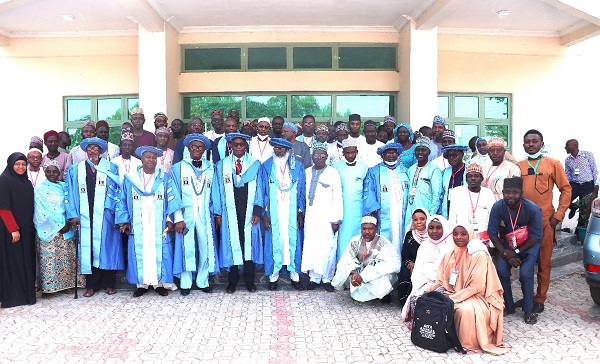
A renowned research professor at the Institute of Agricultural Research and Training (IAR&T) and the newly elected president of the Genetics Society of Nigeria (GSN), Prof. S.A. Olakojo, has acknowledged the diligence and professionalism with which the Open Forum on Agricultural Biotechnology (OFAB) in Africa, Nigeria chapter, carries out its advocacy and communication with stakeholders.
Olakojo made this acknowledgement in his remarks during the recent 44th annual international conference of the society held at the Balarabe Tanimu Conference Hall, Institute for Agricultural Research (IAR), Ahmadu Bello University (ABU), Zaria.
Olakojo was excited about OFAB’s success stories in sensitising the public over the past 10 years. “OFAB Nigeria should be understudied for its understanding of the secret of continuous advocacy for decades,” he advised. “They have continued to take the story of biotechnology to the grass root without any slack.”
On his part, the president, GSN, Prof. Emmanuel Kwon-Ndung, expressed his gratitude to OFAB for continuous support towards GSN and explained that OFAB is playing a very key role in driving Nigeria towards achieving food security.
Kwon-Ndong noted with keen interest the recent approval for the environmental release of TELA Maize by the National Biosafety Management Agency (NBMA). He expressed optimism that, like the PBR Cowpea which has been accepted by farmers all over the country for its triple traits of resistance to drought, the stem borer and fall army worm built, the same qualities imputed into the TELA maize will boost maize production and increase national GDP when it is finally released for production.
Meanwhile, the country coordinator, OFAB, Dr. Rose Gidado, in her lead paper presentation reiterated the safety and benefits of genetically modified crops. The coordinator reassured participants that the adoption of GM Crops by Nigeria will bring the country a lot of fortune by revolutionising her food production and other related agricultural and industrial sectors.
Gidado concurred that consumer acceptance of new biotechnology products requires effective communication. “OFAB Nigeria has continued to work tirelessly over the past 10 years to tackle the existing myths about genetic modification technology using a combinatorial approach. “Our hard work in sensitising the public about the GM crops is paying off with the commercialisation of two GM crops and more in the pipeline.”
With the theme ‘Genetics as a solution to the environment, food security, health and sustainable economic development in the post-pandemic era,’renowned geneticists and dignitaries in attendance discussed how modern technologies can be deployed to alleviate food insecurity challenge in the post-COVID-19 era.
Keynote speaker of the conference and vice-chancellor of the Ibrahim Badamasi Babangida (IBB) University, Lapai, Prof. A.K. Adamu while delivering the keynote speech (‘Building Technology in Genetics: Impact on Economic Development in post-COVID19 Era in Nigeria’) said that no nation in the world can achieve food security without integrating innovative technology such as biotechnology in agriculture.
Vice chancellor of the host institution, Ahmadu Bello University (ABU) Zaria, Prof. Kabir Balla praised the society for choosing food insecurity as one of the major issues to be addressed in the 2021 conference. He was represented by the deputy vice-chancellor of the university, Prof. Ameh.
Other experts at the conference were the vice-chancellor, Al-Qalam University, Katsina State and chairman, board of trustees, GSN, Prof. Shehu G. Ado; Executive secretary, Agricultural Research Council of Nigeria (ARCN), Prof. Garba Hamidu Sharubutu; Executive director, Education and Biotechnology, Carlifonia State University, USA, Prof. Ikhide Imumorin; Executive director, Institute for Agricultural Research (IAR), Prof. M.F. Ishiyaku; Director of research, Ahmadu Bello University Zaria, Prof. Sani Ibrahim; Head of department, Animal Science, Ahmadu Bello University Zaria, Prof. Mohammed Kabir; Prof. Yakubu Abdulmojeed, Nasarawa State University; Prof. S.D. Abdul, Abubakar, Tafawa Balewa University, Bauchi and a host of others.

